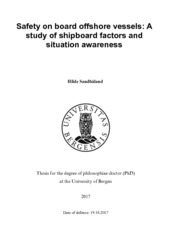| dc.contributor.author | Sandhåland, Hilde | |
| dc.date.accessioned | 2018-01-04T08:14:37Z | |
| dc.date.available | 2018-01-04T08:14:37Z | |
| dc.date.issued | 2017-10-19 | |
| dc.identifier.isbn | 978-82-308-3945-4 | |
| dc.identifier.uri | https://hdl.handle.net/1956/17110 | |
| dc.description.abstract | The overall aim of this thesis is to shed new light on how shipboard factors may influence the ability to achieve and maintain situation awareness (SA) in day-to-day operations on offshore vessels. The term, ‘shipboard factors’ refers to factors in the internal environment on board the vessel, such as work practices, on-board leadership and job demands. Situation awareness is seen as a cognitive process in the individual but also as a distributed characteristic of a complex collaborative system. The thesis consists of three studies, in which we have used three different methods to explore the overall aim of the thesis. The first study, and our point of departure, aimed at identifying human, technical and organizational factors that may have influenced loss of SA in previous accidents at sea. In order to investigate this issue, accident reports (n=23) concerning collisions between offshore vessels and offshore facilities on the Norwegian continental shelf during the period of 2001 to 2011 were analysed. The first part of the study revealed that the collisions were preceded by a loss of SA on the bridge in 18 of the 23 instances. In the second part of the study, the human, technological and organizational causes described in the accident reports were analysed to evaluate how they may have affected the bridge crews’ awareness of the situation. The results indicate that inadequate operation planning, communication failure, interrupting/distracting elements, inadequate design and insufficient training were the most common factors that may have contributed to the bridge crews’ loss of SA. In the second study, we used a fieldwork approach to examine how safety critical aspects of shipboard operations, such as planning practices, communication practices and management of disturbing/interrupting elements, identified in Study 1, play out in real time on board offshore vessels. By means of fieldwork on board four different platform supply vessels, the study aimed to discuss how shipboard practices relative to these matters may affect transactions of SA-related information between different agents on the bridge such as the officers and various technological tools on the bridge. The study thus favours a systems approach to studying SA, viewing it not only as a phenomenon that solely happens in each individual’s mind but rather as something that happens between different agents such as the officers and the tools that they use in day-to-day operations. The study revealed noticeable variations in shipboard practices. In Article II, we point to the following observations as being inappropriate, from a SA perspective: planning and completion of checklists as an individual activity, limited use of standardized and close loop communication, and interruptions/distractions caused by other crew members, electronic devices and administrative tasks. We discuss how these practices may affect timely and adequate transaction of SA related information from the environment and, in that way, influence the ability to achieve and maintain SA in day-to-day operations. In the third study, we used survey data to examine how on-board leadership and psychological job demands combine and influence SA and the willingness to take a risk in day-to-day operations. To this end, a conceptual model was developed and tested on survey data collected on board offshore vessels within a Norwegian controlled shipping company. The model was tested in both the deck department (n=178) and the engine department (n=103). With regard to SA, 21.6% of the variations could be explained by the combined influence of authentic leadership, laissez-faire leadership and job demands in the deck department sample, whereas 27.5% of the variations in SA could be explained by the two leadership styles alone in the engine department sample. Job demands and SA explained 18.9% of the variations in risk-taking behaviour in the deck department sample, whereas these two variables explained 30.8% of the variations in the engine department sample. Taken together, the three studies shed new light on how various shipboard factors may influence the ability to achieve and maintain SA and safe behaviour in a complex collaborative work environment such as bridge operations on offshore vessels. In particular, the study provides insights into how planning, communication and management of distracting/interrupting elements are realized in bridge operations; it also notes possible areas for improvement to enhance SA. In addition, the study expands our understanding of how active and passive leadership styles may combine with psychological job demands to influence SA and safety outcomes in maritime operations. | en_US |
| dc.language.iso | eng | eng |
| dc.publisher | The University of Bergen | eng |
| dc.relation.haspart | Paper I: Sandhåland, H., Oltedal, H., & Eid, J. (2015). Situation awareness in bridge operations–A study of collisions between attendant vessels and offshore facilities in the North Sea. Safety Science, 79, 277-285. The article is available at: <a href="http://hdl.handle.net/1956/10887" target="blank">http://hdl.handle.net/1956/10887</a> | eng |
| dc.relation.haspart | Paper II: Sandhåland, H., Oltedal, H. A., Hystad, S. W., & Eid, J. (2015). Distributed situation awareness in complex collaborative systems: A field study of bridge operations on platform supply vessels. Journal of Occupational and Organizational Psychology, 88, 273-294. The article is available at: <a href="http://hdl.handle.net/1956/11052" target="blank">http://hdl.handle.net/1956/11052</a> | eng |
| dc.relation.haspart | Paper III: Sandhåland, H., Oltedal, H. A., Hystad, S. W., & Eid, J. (2016). Effects of leadership style and psychological job demands on situation awareness and the willingness to take a risk: A survey of selected offshore vessels. Safety Science, 93, 178-186. The article is available in the main thesis. The article is also available at: <a href="https://doi.org/10.1016/j.ssci.2016.12.004" target="blank">https://doi.org/10.1016/j.ssci.2016.12.004</a> | eng |
| dc.title | Safety on board offshore vessels: A study of shipboard factors and situation awareness | eng |
| dc.type | Doctoral thesis | |
| dc.rights.holder | Copyright the Author. All rights reserved | eng |
| dc.identifier.cristin | 1504430 | |
